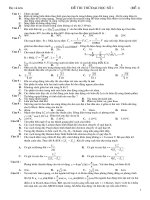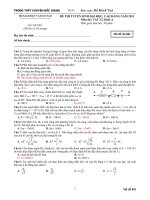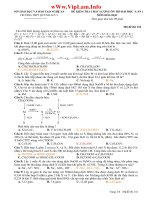Tải Đề thi thử THPT Quốc Gia lần 1 năm 2019 môn Tiếng Anh trường THPT Thái Phiên - Đề thi THPT Quốc Gia môn Anh năm 2019 có đáp án
Bạn đang xem bản rút gọn của tài liệu. Xem và tải ngay bản đầy đủ của tài liệu tại đây (91.87 KB, 9 trang )
<span class='text_page_counter'>(1)</span><div class='page_container' data-page=1>
<b>ĐỀ THI THỬ THPT QUỐC GIA MÔN TIẾNG ANH </b>
<b> NĂM 2019</b>
<b>MƠN TIẾNG ANH CĨ ĐÁP ÁN</b>
<b>Read the following passage and mark the letter A, B, C or D on your answer sheet to</b>
<b>indicate the correct answer to each of the following questions.</b>
VEGETARIANISM
Until recently, vegetarianism was fairly uncommon in Britain, and it is still considered
strange by some. But since the 1960s its popularity has increased greatly, to the (1)
________ that high street stores stock a huge variety of products for vegetarians. The
reasons people give for not eating meat are numerous. Perhaps (2) _________ vegetarians do
it for moral reasons, arguing that it is wrong to kill. The opposing point of view is that it is
natural for us to kill for food, and that we have evolved to do so. Still, there are societies
where eating meat is not allowed because it is (3) _________ their religion. There are other
good reasons to give up meat, one of which is the inefficiency of livestock farming. A single
field of soya bean plants can actually produce 200 times as much protein as the number of
cattle which could be raised on the same area of land, so a vegetarian world might be a
world without hunger. (4) ________ it is, in theory, cheaper to eat only vegetables,
vegetarianism is most popular in richer countries such as Germany and Britain, where many
people exclude meat for health reasons. In these countries, at least, it (5) ________ to be a
matter of choice rather than necessity
Question 1: A. extent B. distance C. length D. measure
Question 2: A. lots B. much C. almost D. most
Question 3: A. opposite B. against C. beside D. across
Question 4: A. Although B. Since C. Despite D. Therefore
Question 5: A. finishes off B. goes through C. comes up D. turns out
<b>Read the following passage and mark the letter A, B, C or D on your answer sheet to</b>
<b>indicate the correct answer to each of the following questions.</b>
TEXAS
</div>
<span class='text_page_counter'>(2)</span><div class='page_container' data-page=2>
intercom. Inside the walls of Hemptead Middle School, a language controversy is brewing.
“There’s one teacher that said, “If you speak Spanish in my class, I’m gonna write you up,”
8th grader Tiffani Resurez says. Four students say their principal’s announcement – banning
them from speaking Spanish in class – has given teachers and fellow students a hall pass to
discriminate. “She was like, “No speaking Spanish.” She told me that. I was like, “That’s my
first language.” She said, “Well, you can get out,” fellow classmate Yedhany Gallegos says.
A letter sent home by the superintendent says, “Neither the district nor any campus has any
policy prohibiting the speaking of Spanish.” The four students feel that the statement from
the superintendent has not been made entirely clear that their school. “People don’t want to
speak it anymore and don’t want to get caught speaking it because they’re going to get into
trouble,” 6th grader Kiara Lozano says. Parents, like Cynthia Zamora, believe the school is
not getting to the <b>root</b> of the problem. She wants to know why the “No Spanish”
announcement was ever made in the first place. “I was very surprised that she would even go
to such lengths,” Zamora says. Many students at the school grew up speaking Spanish at
home, and they say <b>i</b>t often comes as second nature when they’re talking to each other at
school. “I’m not scared. I’m gonna keep speaking my language. That’s my first language,
and I’m gonna keep doing it,” Lozano said. The principal has been placed on paid
administrative leave while the district investigates. A spokewoman for Hempstead
Independent School District has released a statement saying, in part, “The district is
committed to efficiently and effectively resolving this matter with as little disruption to our
students and their learning environment as possible.”
Question 6: In the passage, the word “<b>root</b>” is closest in meaning to _______.
A. solution B. cause C. ground D. time
Question 7: Why was the policy introduced?
A. The superintendent wants students to speak only English at school
B. No one at school is Spanish
C. The principal hates Spanish
D. The reason is not mentioned
</div>
<span class='text_page_counter'>(3)</span><div class='page_container' data-page=3>
B. Students were against the rule at first but then compromised.
C. The principal who made this announcement hated Spanish.
D. Only people inside of the school knew about the rule when it was announced.
Question 9: What will the district do?
A. Dismiss the principal
B. Solve the problem
C. Ask all students to remain silent about the issue
D. Apologize for their mistake
Question 10: In the passage, the word “<b>it</b>” refers to _________.
A. the local accent B. Spanish C. English D. slang
<b>Read the following passage and mark the letter A, B, C or D on your answer sheet to</b>
<b>indicate the correct answer to each of the following questions.</b>
'A good book for children should simply be a good book in its own right.' These are the
words of Mollie Hunter, a well known author of books for youngsters. Born and bred near
Edinburgh, Mollie has devoted her talents to writing primarily for young people. She firmly
believes that there is always and should always be a wider audience for any good book
whatever its main market. In Mollie's opinion it is essential to make full use of language and
she enjoys telling a story, which is what every writer should be doing: 'If you aren't telling a
story, you're a very dead writer indeed,' she says.
</div>
<span class='text_page_counter'>(4)</span><div class='page_container' data-page=4>
Thoughts of her childhood inevitably brought thoughts of the time when her home was still a
village with buttercup meadows and strawberry fields - sadly now covered with modern
houses. 'I was once taken back to see <b>it</b> and I felt that somebody had lain dirty hands all over
my childhood. I'll never go back,' she said. 'Never.' 'When I set one of my books in
Scotland,' she said, 'I can recapture my romantic feelings as a child playing in those fields, or
watching the village blacksmith at work. And that's important, because children now know
so much so early that romance can't exist for them, as it did for us.'
To this day, Mollie has a lively affection for children, which is reflected in the love she has
for her writing. 'When we have visitors with children the adults always say, "If you go to
visit Mollie, she'll spend more time with the children." They don't realise that children are
much more interesting company. I've heard all the adults have to say before. The children
have something new.'
Question 11: In Molie Hunter’s opinion, one sign of a poor writer is ________.
A. complicated ideas B. the weakness of the description
C. lifeless characters D. the absence of a story
Question 12: What does “it” in paragraph 3 refer to?
A. ambition B. picture C. novel D. struggle
Question 13: How does Mollie feel about what has happened to her birthplace?
A. surprised B. ashamed C. disappointed D. confused
Question 14: What do we learn about Mollie Hunter as a very young child?
A. She didn’t enjoy writing stories B. She didn’t have any particular ambitions
C. She didn’t expect to become a writer D. She didn’t respect her teacher’s views
Question 15: In comparison with children of earlier years, Mollie feels that modern children
are _____.
A. better informed B. more intelligent
C. less interested in fiction D. less keen to learn
Question 16: What does Mollie Hunter feel about the nature of a good book?
A. It should be based on original ideas B. It should not aim at a narrow audience
</div>
<span class='text_page_counter'>(5)</span><div class='page_container' data-page=5>
A. to provide information for Mollie Hunter’s existing readers
B. to introduce Mollie Hunter’s work to a wider audience
C. to describe Mollie Hunter’s most successful books
D. to share her enjoyment of Mollie Hunter’s books
Question 18: Mollie’s adult visitors generally discover that _____.
A. she talks a lot about her work B. she is a very generous person
C. she pays more attention to their children D. she is interesting company
<b>Mark the letter A, B, C or D on your answer sheet to indicate the word whose</b>
<b>underlined part differs from the other three in pronunciation in the following</b>
<b>questions.</b>
Question 19: A. pleased B. released C. ceased D. increased
Question 20: A. profile B. stomach C. postpone D. cyclone
<b>Mark the letter A, B, C or D on your answer sheet to indicate the word that differs</b>
<b>from the other three in the position of primary stress in the following questions.</b>
Question 21: A. compass B. comedy C. comfort D. command
Question 22: A. atmosphere B. Vietnamese C. entertain D. picturesque
<b>Mark the letter A, B, C or D on your answer sheet to indicate the underlined part that</b>
<b>needs correction in the following questions.</b>
Question 23: The children are extremely excited about the visit to the town where their
grandparents were born in.
A. about B. were C. where D. the town
Question 24: Some of the jobs described in the job interview were writing essays, correcting
papers, and reports typing.
A. essays B. were C. reports typing D. described
Question 25: She always wishes to be chosen for the national ballet team, just alike her
mother.
A. alike B. her mother C. for D. to be chosen
<b>Mark the letter A, B, C or D on your answer sheet to indicate the most suitable</b>
<b>response to complete each of the following questions.</b>
</div>
<span class='text_page_counter'>(6)</span><div class='page_container' data-page=6>
- Jasmine: “ _______. I saw you, but you were talking to someone”
A. No, I didn’t B. Yes, I did C. Let me see D. I went
Question 27: - Mother: “How come you didn’t tell me that you would quit your job?”
- Lisa: “__________.”
A. I’d love to tell you now
B. Because I knew that you would make a fuss about it
C. I have no idea
D. Because I’m so bored with it
<b>Mark the letter A, B, C or D on your answer sheet to indicate the word(s) CLOSEST in</b>
<b>meaning to the underlined word(s) in each of the following questions.</b>
Question 28: The <b>renovation</b> of the national museum is now nearing completion.
A. intervention B. restoration C. maintenance D. repairing
Question 29: The problem of salary didn’t <b>come up in</b> the meeting last week.
A. mention B. approach C. raise D. arise
<b>Mark the letter A, B, C or D on your answer sheet to indicate the word(s) OPPOSITE</b>
<b>in meaning to the underlined word(s) in each of the following questions.</b>
Question 30: Although not essential, some <b>prior</b> knowledge about the company when
applying is desirable.
A. subsequent B. preceding C. respective D. bygone
Question 31: Your suggestions are not <b>in harmony with</b> the aims of our project.
A. incompatible with B. indifferent to C. disagreeable with D. unaccompanied by
<b>Mark the letter A, B, C or D on your answer sheet to indicate the correct answer to</b>
<b>each of the following questions.</b>
Question 32: The biologists have found more than one thousand types of butterflies in the
forest, ______ its special characteristics.
A. each one has B. which has C. each having D. having
Question 33: If you are ______ of hearing, these hearing aids will be invaluable.
A. poor B. weak C. hard D. short
</div>
<span class='text_page_counter'>(7)</span><div class='page_container' data-page=7>
C. Were you to ask D. Should you ask
Question 35: Jenny has an _______ command of Japanese cuisine.
A. intensive B. utter C. impressive D. extreme
Question 36: The new airport has ______ a lot of changes on this island.
A. brought about B. taken to C. counted in D. turned up
Question 37: The new secretary is really asking for trouble, ______ the boss‟s requests like
that.
A. to ignore B. ignore C. is ignoring D. ignoring
Question 38: The way in which we work has _______ a complete transformation in the past
decade.
A. undercovered B. undertaken C. undergone D. underdone
Question 39: He was accused to theft, but then he ______ as the real thief confessed to the
police.
A. appeared in broad daylight B. cleared his name
C. kept it up his sleeve D. caught himself red-handed
Question 40: The government has made a big effort to tackle the two most important
_______ issues of our country.
A. society B. socialize C. sociable D. social
Question 41: They have signed an agreement to protect the forests _______ all over the
world.
A. being cut down B. that cut down
C. which are cut down D. are being cut down
Question 42: Pat, put all your toys away _______ someone slips and falls on them.
A. otherwise B. in case C. provided that D. so long as
Question 43: Vietnam has played _______ high spirits and had an impressive 2-0 victory
over Yemen.
A. at B. in C. on D. with
Question 44: By the time the software _______ on sale next month, the company ______ $2
million on developing it.
</div>
<span class='text_page_counter'>(8)</span><div class='page_container' data-page=8>
C. has gone – will spend D. goes – will have spent
Question 45: The excursion is ______ unique opportunity to discover _______ wild in its
natural beauty.
A. an – Ø B. a – the C. the – the D. an – the
<b>Mark the letter A, B, C or D on your answer sheet to indicate the sentence that is</b>
<b>closest in meaning to each of the following questions.</b>
Question 46: The only members of the cat family that can roar are lions, leopards, tigers and
jaguars, but lions are by far the loudest.
A. Lions, leopard, tigers and jaguars are the only four cats that can roar; however, the others
can’t roar as loudly as lions.
B. Like leopard, tigers, and jaguars, lions are among the members of the cat family that can
roar.
C. Lions, leopard, tigers and jaguars can roar, however the roar of a lion is not as frightening
as that of the others.
D. Since lions come from the same cat family as leopards, tigers and jaguars do, they can
roar as loud as the others.
Question 47: The likelihood of suffering a heart attack rises as one becomes increasingly
obese.
A. Heart attack are happening more and more often, and most of the suffers are obese.
B. The more obese one is, the higher the chances for a heart attack become.
C. Obesity results in only a slight increase in the probability of having a heart attack.
D. Anyone who is obese is likely to experience a heart attack at any time.
Question 48: It seems to me that we’ve taken the wrong train.
A. The trained turned out to be not the one we were supposed to have taken.
B. There is no chance that we‟ll catch the train that we‟re supposed to.
C. I have a feeling that this train is not the one we should be on.
D. I wish we had been more careful and taken the right train from the station.
<b>Mark the letter A, B, C or D on your answer sheet to indicate the sentence that best</b>
<b>combines each pair of sentences in the following questions.</b>
</div>
<span class='text_page_counter'>(9)</span><div class='page_container' data-page=9>
A. My sisters rarely speak because they have never liked each other.
B. Because they have never got on, my sisters do not speak to each other.
C. My sisters were once close, but they rarely speak to each other now.
D. My sisters do not speak to each other much, but they are good friends.
Question 50: We should quickly find a solution to the problem. Otherwise, its impact on
those concerned will increase.
A. If we can solve this problem soon, we will lower the impact on all of our concerns.
B. The sooner we find a solution to the problem, the lower the impact it has on those
concerned.
C. If all those concerned lower their impact, the problem will be better solved.
D. By the time we solve this problem, the impact on those concerned will have been lower.
<b>ĐÁP ÁN</b>
1-A 2-D 3-B 4-A 5-D 6-B 7-D 8-B 9-B 10-B
11-D 12-A 13-C 14-C 15-A 16-B 17-B 18-C 19-A 20-B
21-D 22-A 23-C 24-C 25-A 26-B 27-B 28-B 29-D 30-A
31-A 32-A 33-C 34-C 35-C 36-A 37-D 38-C 39-B 40-C
41-A 42-B 43-B 44-D 45-B 46-A 47-B 48-C 49-C 50-B
</div>
<!--links-->









